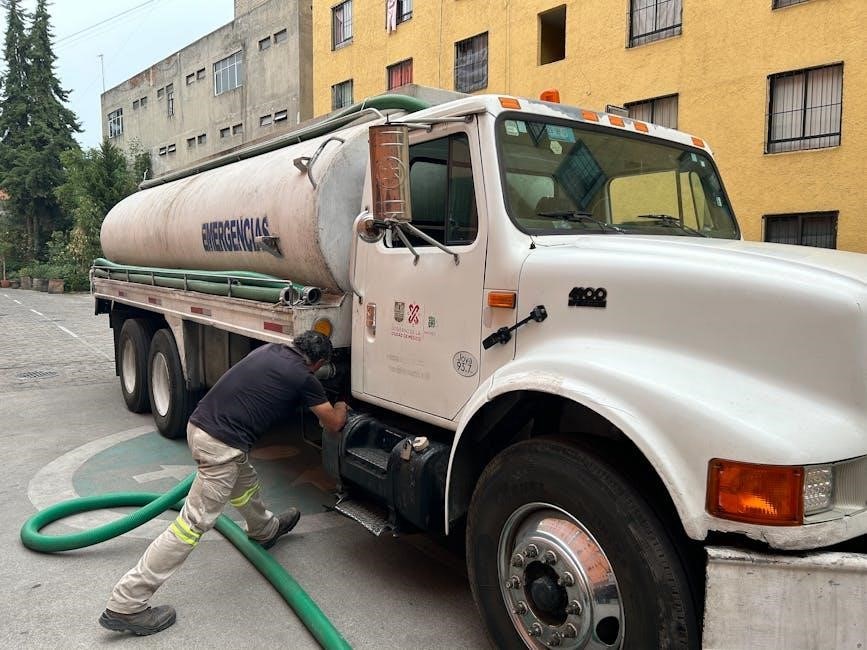
operation manager duties and responsibilities pdf
Operations management involves overseeing day-to-day activities to ensure efficiency and productivity. An operations manager is responsible for planning, coordinating, and supervising processes to meet organizational goals.
1.1 Definition and Role of an Operations Manager
An operations manager oversees the execution of day-to-day activities, ensuring efficiency and alignment with organizational goals. Their role includes planning, coordinating, and supervising processes, resource allocation, and compliance with regulations to achieve optimal productivity and profitability.
1.2 Importance of Operations Management in Organizations
Operations management is crucial for achieving organizational efficiency, productivity, and profitability. It ensures smooth production processes, effective resource allocation, and compliance with regulations, fostering a competitive edge and enabling companies to deliver high-quality products and services consistently.
1.3 Key Skills and Qualities of an Effective Operations Manager
An effective operations manager must possess strong leadership, strategic thinking, and problem-solving skills. They should excel in communication, time management, and decision-making, ensuring alignment with organizational goals while fostering innovation and adaptability in dynamic environments.

Day-to-Day Operations Management
Day-to-day operations management involves managing workflows, coordinating departments, and monitoring processes to ensure smooth and efficient operations, aligning with organizational objectives and maintaining high performance standards.
2.1 Planning and Scheduling Workflows
Planning and scheduling workflows involve creating detailed timelines and allocating resources to ensure tasks are completed efficiently. Operations managers develop strategies to prioritize activities, balance workloads, and meet deadlines while maintaining quality and productivity standards across the organization.
2.2 Coordinating Activities Across Departments
Coordinating activities across departments ensures seamless communication and collaboration. Operations managers facilitate cross-functional teamwork, align goals, and integrate resources to achieve organizational objectives efficiently while addressing interdepartmental challenges and fostering a cohesive work environment.
2.3 Monitoring and Optimizing Operational Processes
Monitoring operational processes involves tracking performance to identify inefficiencies. Operations managers implement improvements, ensure compliance with standards, and optimize resource allocation to enhance productivity and meet organizational goals effectively.
Human Resource Management
Human Resource Management involves overseeing recruitment, training, employee relations, and performance evaluations to ensure a skilled and motivated workforce aligned with organizational goals.
3.1 Recruitment, Training, and Development of Staff
Operations managers oversee recruitment, selecting candidates, and conducting interviews. They design training programs, develop employee skills, and ensure continuous development to maintain a competent and adaptive workforce.
3.2 Employee Relations and Conflict Resolution
Operations managers foster positive employee relations by addressing grievances and resolving conflicts. They mediate disputes, ensure fair treatment, and promote a harmonious work environment, aligning with organizational policies and legal standards to maintain productivity and employee satisfaction.
3.4 Performance Evaluation and Team Motivation
Operations managers evaluate employee performance, set goals, and provide feedback to enhance productivity. They motivate teams through recognition, incentives, and fostering a positive work culture, ensuring alignment with organizational objectives and promoting professional growth.

Facilities and Infrastructure Management
Operations managers oversee facilities and infrastructure, ensuring proper maintenance, functionality, and safety. They manage vendors, coordinate repairs, and ensure compliance with safety and regulatory standards daily.
4.1 Maintenance and Upkeep of Facilities
Operations managers ensure facilities are well-maintained, overseeing repairs, cleaning, and upgrades. They schedule routine inspections, manage vendor services, and enforce safety protocols to maintain operational efficiency and compliance with regulations, ensuring a safe and functional environment for all employees and activities.
4.2 Vendor Management and Supplier Coordination
Operations managers handle vendor relationships, ensuring timely delivery of goods and services. They negotiate contracts, monitor performance, and resolve issues to maintain quality and cost efficiency, fostering strong partnerships that align with organizational objectives and operational needs.
4.3 Ensuring Safety and Compliance Standards
Operations managers oversee safety protocols and regulatory compliance, ensuring all processes meet legal and industry standards. They conduct audits, implement emergency procedures, and train staff to maintain a safe working environment while adhering to health, safety, and environmental regulations.
Logistics and Supply Chain Management
Operations managers oversee logistics and supply chain processes, ensuring efficient procurement, inventory control, and distribution. They coordinate supplier relationships and optimize supply chain operations for cost-effectiveness and alignment with business objectives.
5.1 Procurement and Inventory Control
Operations managers handle procurement strategies, ensuring timely acquisition of materials. They implement inventory control systems to minimize costs, optimize stock levels, and maintain supply chain efficiency. Effective procurement and inventory management are critical for smooth production and delivery processes, aligning with organizational objectives and ensuring resource allocation is maximized for profitability.
5.2 Managing Distribution and Delivery Processes
Operations managers oversee distribution and delivery processes, ensuring efficient logistics and timely order fulfillment. They coordinate transportation, manage inventory flow, and monitor compliance with regulations to maintain seamless supply chain operations and high customer satisfaction levels.
5.3 Optimizing Supply Chain Efficiency
Operations managers analyze and streamline supply chain processes to reduce costs and improve delivery times. They implement advanced logistics systems, enhance supplier relationships, and leverage data analytics to identify inefficiencies and drive continuous improvement in the supply chain operations.

Financial Management and Budgeting
Operations managers prepare and manage operational budgets, ensuring cost-effective resource allocation. They oversee financial reporting and analysis to support informed decision-making and strategic planning within the organization.
6.1 Preparing and Managing Operational Budgets
Operations managers develop and manage operational budgets, ensuring alignment with organizational goals. They allocate resources efficiently, monitor expenditures, and adjust plans to maintain financial stability and achieve profitability targets while minimizing unnecessary costs.
6.2 Cost Control and Resource Allocation
Operations managers implement cost-saving strategies and allocate resources efficiently to maximize productivity. They monitor expenditures, analyze financial data, and optimize spending to reduce waste, ensuring alignment with organizational goals and compliance with budgetary constraints for sustainable growth.

6.3 Financial Reporting and Analysis
Operations managers prepare accurate financial reports and analyze data to monitor performance. They review budget adherence, identify cost-saving opportunities, and forecast future needs, ensuring financial transparency and compliance with organizational objectives for informed decision-making and strategic planning.
Compliance and Risk Management
Operations managers ensure regulatory compliance, mitigate operational risks, and implement safety protocols to safeguard assets and ensure adherence to legal and organizational standards.
7.1 Ensuring Regulatory Compliance

Operations managers ensure adherence to legal and industry regulations, conducting audits and risk assessments to maintain compliance and avoid penalties, while aligning processes with organizational and governmental standards.
7.2 Identifying and Mitigating Operational Risks
Operations managers proactively identify potential risks, such as supply chain disruptions or safety hazards, and implement strategies to mitigate them, ensuring business continuity and minimizing impacts on productivity and profitability.
7.3 Implementing Safety Protocols and Emergency Procedures
Operations managers develop and enforce safety protocols, conduct regular drills, and establish emergency response plans to ensure workplace safety, compliance with regulations, and preparedness for unforeseen incidents, protecting both employees and organizational assets effectively.
Strategic Planning and Innovation
Operations managers develop strategies, allocate resources, and drive innovation to enhance operational efficiency, aligning with organizational goals and ensuring sustainable growth.
8.1 Developing Operational Strategies
Operations managers create actionable plans to achieve organizational objectives, ensuring alignment with company goals. They allocate resources, set priorities, and define actionable steps to drive efficiency and productivity, fostering innovation and continuous improvement across all operational processes.
8.2 Driving Process Improvements and Innovation
Operations managers identify inefficiencies and implement innovative solutions to enhance workflows. They lead teams in adopting new technologies and methodologies, ensuring operational excellence and fostering a culture of continuous improvement to stay competitive and meet evolving organizational needs effectively.
8.3 Aligning Operations with Organizational Goals
Operations managers ensure operational activities align with the company’s strategic objectives. They translate organizational goals into actionable plans, fostering collaboration across departments to achieve mission-critical targets and drive sustainable growth while maintaining operational efficiency and adherence to corporate policies.

Performance Monitoring and Reporting
Operations managers monitor performance, prepare reports, and conduct audits to ensure efficiency and alignment with goals, enabling informed decision-making and continuous improvement.

9.1 Setting and Tracking Key Performance Indicators (KPIs)
Operations managers define and monitor KPIs to evaluate performance, track progress toward goals, and identify areas for improvement. Regular analysis of KPI data ensures alignment with organizational objectives and drives informed decision-making.
9.2 Generating Operational Reports and Analytics
Operations managers produce detailed reports and analytics to assess performance, identify trends, and provide insights. These tools enable data-driven decisions, improve efficiency, and ensure alignment with strategic goals, fostering transparency and accountability across the organization.
9.3 Conducting Regular Audits and Reviews
Operations managers perform audits to evaluate operational efficiency, compliance, and effectiveness. These reviews identify gaps, ensure adherence to standards, and drive continuous improvement, fostering a culture of accountability and enhancing overall organizational performance and reliability.

Customer Service and Relations
Operations managers oversee customer service initiatives, ensuring prompt issue resolution, enhancing service quality, and aligning services with customer expectations to build loyalty and satisfaction.
10.1 Managing Client Relationships
Operations managers build and maintain strong client relationships by ensuring clear communication, personalized service, and timely issue resolution. They foster trust and loyalty, aligning services with client needs to enhance satisfaction and long-term partnerships. Effective client management is crucial for retention and business growth.

- Building trust through reliable service delivery.
- Addressing client concerns promptly and professionally.
- Regularly seeking client feedback for improvement.
10.2 Ensuring High Levels of Customer Satisfaction
Operations managers ensure customer satisfaction by monitoring service delivery, setting quality standards, and addressing feedback. They implement improvements to meet client expectations, fostering loyalty and repeat business. Regular audits and staff training help maintain high service levels and resolve issues promptly.
- Monitoring service delivery for consistency.
- Setting clear quality and performance standards.
- Analyzing customer feedback for continuous improvement.
10.3 Handling Customer Complaints and Feedback
Operations managers address customer complaints promptly, ensuring issues are resolved fairly and efficiently. They analyze feedback to identify patterns, improve processes, and enhance overall customer experience. Effective communication and problem-solving skills are essential to maintain satisfaction and build long-term relationships.
- Receiving and categorizing customer feedback.
- Investigating and resolving complaints efficiently.
- Implementing changes based on customer insights.
Operations management is crucial for organizational efficiency, ensuring smooth workflows and resource allocation. Future trends include leveraging AI, automation, and data analytics to optimize processes and enhance decision-making capabilities.
11.1 Summary of Key Duties and Responsibilities
An operations manager oversees daily activities, ensuring efficiency and compliance. Key duties include planning workflows, managing budgets, training staff, coordinating logistics, and maintaining facilities. They also monitor performance, mitigate risks, and implement safety protocols to achieve organizational goals and drive continuous improvement.
11.2 Emerging Trends in Operations Management
Emerging trends include leveraging AI, machine learning, and IoT for process optimization. Automation, data analytics, and sustainability practices are gaining traction. Organizations are also adopting agile methodologies and focusing on resilience and adaptability to stay competitive in a rapidly changing business environment.
11.3 The Evolving Role of the Operations Manager
The role of operations managers is shifting toward strategic leadership, leveraging technology like AI and automation. They now focus on data-driven decision-making, sustainability, and innovation. Additionally, managing remote teams and ensuring agility in operations are becoming critical skills in today’s dynamic business landscape.